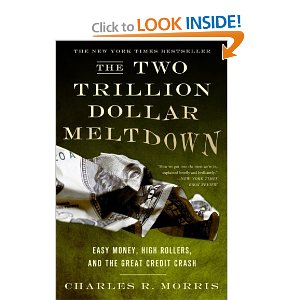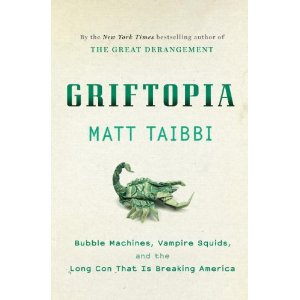
Charles R. Morris
![]() Forward to Future of Capitalism and GRIFTOPIA
Forward to Future of Capitalism and GRIFTOPIA
November 8, 2010
This book was flagged to my attention in the Comments section of my own review of Griftopia: Bubble Machines, Vampire Squids, and the Long Con That Is Breaking America, where my review includes the following quote that I share here:
QUOTE (32): What has taken place over the last generation is a highly complicated merger of crime and policy, of stealing and government. Far from taking care of the rest of us, the financial leaders of America and their political servants have seemingly reached the cynical conclusion that our society is not work saving and have taken on a new mission that involved not creating wealth for us all, but simply absconding with whatever wealth remains in our hollowed out economy. They don't feed us, we feed them.
I defer to the other reviewers on the substance of the book, but want to provide links here to several books that address the larger context of the soul of capitalism and the corruption of the two political parties that have undermined the US Government and US economy with malice aforethought.
Capitalism:
The Battle for the Soul of Capitalism
The Betrayal of American Prosperity: Free Market Delusions, America's Decline, and How We Must Compete in the Post-Dollar Era
The Soul of Capitalism: Opening Paths to a Moral Economy
The Genius of the Beast: A Radical Re-Vision of Capitalism
Corrupt Two-Party Tyranny
Running on Empty: How the Democratic and Republican Parties Are Bankrupting Our Future and What Americans Can Do About It
Grand Illusion: The Myth of Voter Choice in a Two-Party Tyranny
Election 2008: Lipstick on the Pig (Substance of Governance; Legitimate Grievances; Candidates on the Issues; Balanced Budget 101; Call to Arms: Fund We Not Them; Annotated Bibliography)
The Broken Branch: How Congress Is Failing America and How to Get It Back on Track (Institutions of American Democracy)
Breach of Trust: How Washington Turns Outsiders Into Insiders
I am blogging twice a week at Huffington Post on what a Virtual Cabinet doing sane evidence-driven policies in the context of a balanced responsible budget might look like, and would welcome visits there by those interested in getting back to honest government and responsible capitalism.







